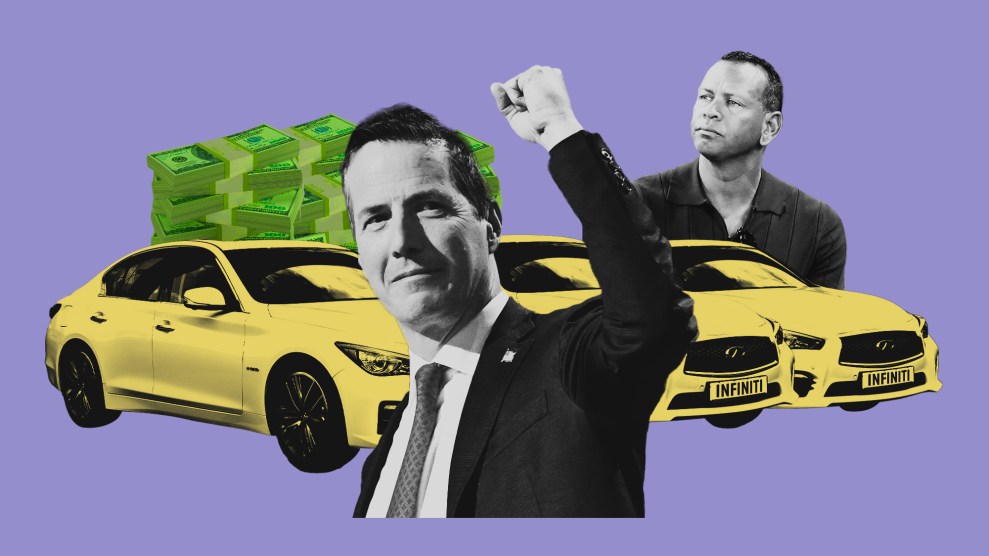
Mother Jones; Angela Weiss/AFP/Getty; Jean Catuffe/Getty; Wikimedia
Bernie Moreno’s network of car dealerships is the building block of the Ohio Republican’s campaign for US Senate. Moreno, who is seeking to unseat three-term Democratic Sen. Sherrod Brown in one of the year’s tightest races, has acquired and eventually sold off more than two dozen dealerships between 2005 and 2022 and grew enormously rich in the process. He is worth as much as $105.7 million, according to financial disclosures—wealth that helped power him to victory in an ugly primary this spring. That private sector track record is also a part of his pitch on the campaign trail, where he describes himself as a self-made man who “mortgaged everything I own in life” to buy his first Mercedes-Benz dealership in Cleveland and who built a successful company “with no partners.”
The up-by-the-bootstraps campaign trail story belies a more complicated reality. While Moreno describes his immigrant family as “lower middle class” and said they “came here with absolutely nothing,” a New York Times report in May detailed the Morenos’ powerful political and financial connections in Colombia, where one brother runs a major construction firm and another served as president of the Inter-American Development Bank. As he has attempted to position himself as a candidate for the working man, Moreno has been dogged, too, by questions about how he made his money. Earlier this year, my colleague Abby Vesoulis reported that Moreno shelled out more than $400,000 to settle a wage-theft lawsuit in Massachusetts in which “he was forced to admit to shredding overtime-payment records.” He eventually settled more than a dozen claims of wage theft at his dealerships in the commonwealth, along with a host of other complaints from former employees—outcomes he has blamed on disgruntled workers and “activist” judges.
Moreno was, by all accounts, a highly effective car dealer whose energy and risk-taking helped him thrive in a cutthroat industry. But records from a nearly decade-old legal battle involving a dealership in South Florida tell a more nuanced story about Moreno’s rise, and the breaks he got along the way.
The 2014 complaint in the Florida Division of Administrative Hearings centered on attempts by the Infiniti division of Nissan to expand its footprint in the highly competitive South Florida luxury car market by opening a new Infiniti dealership in downtown Coral Gables. After the company announced that Moreno—who had opened nine dealerships for brands such as Porsche, Mercedes-Benz, Kia, BMW, and Saab—would be their guy, two neighboring dealers lodged an official protest with the Florida Department of Highway Safety, claiming that Nissan was infringing on their home turf and granting special favors to Moreno.
The South Florida case offered a glimpse of the breaks that helped Moreno climb to the top of the profession. He drew the ire of rival dealers by collecting millions of dollars in financial assistance from manufacturers to open new storefronts, and he testified that Mercedes-Benz had pulled strings to get him a sweetheart deal on his very first Ohio dealership. Ultimately, he secured his Florida “dream” project only after a top competitor was laid low by a scandal involving a failed drug test.
At the hearing that fall, Moreno was a star witness. He described how he got his start as a deputy to the New England car mogul Herb Chambers, an avid yacht collector who commuted to his Massachusetts headquarters by helicopter. They had a “father/son relationship,” Moreno said, but not long after vacationing together in the Caribbean, Moreno and Chambers had a falling-out, and the understudy went into business by himself, spending about $2 million in 2005 to purchase and overhaul a Mercedes-Benz dealership in North Olmsted, Ohio.
“I took every dollar that I had ever seen in my life and managed to save and bought the dealership,” Moreno testified. He even drained his 401(k)—“which is not a good financial move,” he conceded, “but that was my only choice.”
But Moreno did not just mortgage his property in Key Largo. He also got a bit of help. “[W]hat happened was they wanted a minority operator there,” he explained, in comments that were first reported by Business Insider in March. Mercedes arranged for the owner—billionaire automotive tycoon Roger Penske—“to sell that dealership for a dramatically reduced price in exchange for Mercedes giving Penske an open point in Chandler, Arizona,” Moreno said.
Moreno explained that big car companies were “under a lot of pressure to have the dealer body be diverse, be representative of the community. And so I’m certain, at that time, when—they may have been getting pressure to have more diversity among their dealership ranks, have the dealer body be diverse, be representative of the community.” During his Senate campaign, Moreno has railed against “wokeness” and referred to Diversity, Equity, and Inclusion programs as “a new form of racism.”
“Bernie was offered this opportunity because he is a talented businessman, and he was able to turn this location into a successful dealership,” a Moreno campaign spokesperson said in a statement. “As he has said time and time again, Bernie believes that merit should always be the singular factor in these decisions—period. His dealerships performed to the highest standard, and he believes that success should be the only factor for hiring practices, promotions, and business dealings.”
The spokesperson added: “As Bernie has said time and time again, his family did not give him a cent to start his own business. He took a huge financial risk on his own to build a wildly successful car business.”
By the time he got wind of Infiniti’s plans to open a Coral Gables location in 2011, Moreno had become a star in the industry, with operations in Ohio, Kentucky, and Massachusetts. Having grown up in the Miami area, he testified that his “heart started beating” when thought about opening a new dealership nearby. Moreno described driving through Coral Gables one day when he saw a vacancy on the ground floor of the Bacardi Building, which is home to the beverage company’s world headquarters. This time, he leveraged his family connections with a nephew, who worked for the “number three guy” at the private equity giant Fortress Investments, which had recently sold the property. “With a little bit of his assistance,” Moreno said, he secured “really favorable lease terms.”
But the bid for the Infiniti dealership was still a bit of a gamble for both parties. In a 124-page prospectus Moreno’s Collection Auto Group submitted as part of the company’s proposal for the dealership, the company included a “Capitalization Plan” with a detailed description of Moreno’s assets at the time. “Necessary Working Capital will be funded,” Collection Auto wrote, “from profits from existing operations in Northeast Ohio…Moreno Family cash reserves, and/or liquidation of select Northeast Ohio stores as necessary.” The document included a handwritten insertion that Collection Auto was prepared to invest “whatever necessary” in the dealership. A campaign spokesperson said that the “cash reserves” in question referred to Moreno’s own funds, and not the extended Moreno family.
While Moreno testified that his dealership group brought in about $15 million in profit a year, he had poured most of his own income into real estate and new projects—a bank statement attached to the prospectus showed just $55,000 in a personal savings account at the time, while his corporate books listed about $2 million in available funds. Jeffrey Harris, then the regional vice president for Infiniti’s operations in the eastern United States, testified that his biggest concern with Moreno’s pitch was “capitalization,” comparing the highly leveraged businessman to a “Silicon Valley startup.”
To cover the costs, Moreno got a much-needed handout. A centerpiece of the case was a confidential agreement Moreno signed with Infiniti. The manufacturer offered $4.4 million in financial assistance, about $2.4 million of which came in the form of performance incentives but the rest came in guaranteed payouts to defray the cost of rent and—somewhat presciently—delays due to litigation. According to court records, Nissan also gave Moreno $1.25 million in assistance to open a dealership in Akron, $650,000 to open a location in Cleveland, and $3.75 million to open another dealership by that city’s airport.
“Your honor, they keep giving this guy money,” complained John Forehand, an attorney for one of the plaintiffs, South Motors. “They aren’t giving anybody else money.”
That turned out to be an overstatement—Infiniti actually had offered a similar amount to South Motors previously to encourage it to open a new shop, and Moreno, for his part, testified that the $4.4 million in assistance was less than he’d asked for. The arrangement with Moreno was not “typical,” but “I wouldn’t call it uncommon,” said Harris, who argued that the large stipend was necessary to secure competitive locations in areas with high rents and startup costs, and that the accompanying confidentiality agreements were a necessity to prevent dealers from bragging to each other about their financial assistance. A judge at the Florida Division of Administrative Hearings in Tallahassee ultimately ruled in Nissan’s favor, and Moreno’s dealership opened in 2017.
But the case exposed discontent among smaller salesmen. A 2016 report in the trade journal Automotive News, which cited Nissan’s close financial relationship with Moreno, found that the assistance “has put Nissan at odds with some dealers, especially those who have smaller lots and lack the means or stomach to invest millions of dollars. Some have surrendered their franchises; others have faced termination notices from the manufacturer, numerous dealers report.”
Later that year, in response to the Automotive News story, four Ohio dealers sued Nissan alleging that the manufacturer had given Moreno an illegal competitive advantage by lavishing incentives on him. Nissan denied that it gave any dealer preferential treatment, and the case was eventually settled with no admission of wrongdoing.
The South Florida dispute also offered a glimpse of the attributes that have made Moreno successful in Republican politics, where he is hoping to ride the coattails of the ur-salesman, Donald Trump. Moreno was promising a flashy new facility, with an in-house nail bar to cater to women, and specially imported “high, high end Colombian coffee.” (His great-grandfather, he said, founded the Federation of Coffee Growers of Colombia—known to American consumers by its fictional pitchman, Juan Valdez.)
In his own testimony, Harris, the Infiniti executive, stated that Moreno had sold more cars in a month at one Cleveland dealership than his predecessor had sold in six months. “Bernie is now being chased by every manufacturer out there,” he said. “Mercedes is chasing him. Infiniti is chasing him…Bernie is absolutely one of the best.”
Sometimes, he could be both relentless and lucky. During the proceedings, Harris testified that despite Moreno’s best efforts, the company had initially reached an agreement with a different suitor for the Coral Gables location—the Major League Baseball star Alex Rodriguez, a hometown hero whose personal fortune and $27 million-a-year contract with the New York Yankees meant the company wouldn’t have to worry about capital costs.
“When I chose Alex as the number one candidate, I did get a text from Bernie every time he went 0 for 4,” Harris testified. “He’d say, ‘Your dealer just went 0 for 4 last night.’”
Ultimately, A-Rod’s baseball career worked against him. The New York Yankee pulled out of the deal after he was suspended for the entire 2014 season for steroid use, jeopardizing his coveted cash flow.
“[W]hen Alex fell through, I immediately called Bernie and said, ‘Bernie, can you still do what you proposed?’ And he said, ‘yes,’” Harris said.
Correction, August 20: An earlier version of this story misstated which brand of car Moreno sold at his first dealership.

















